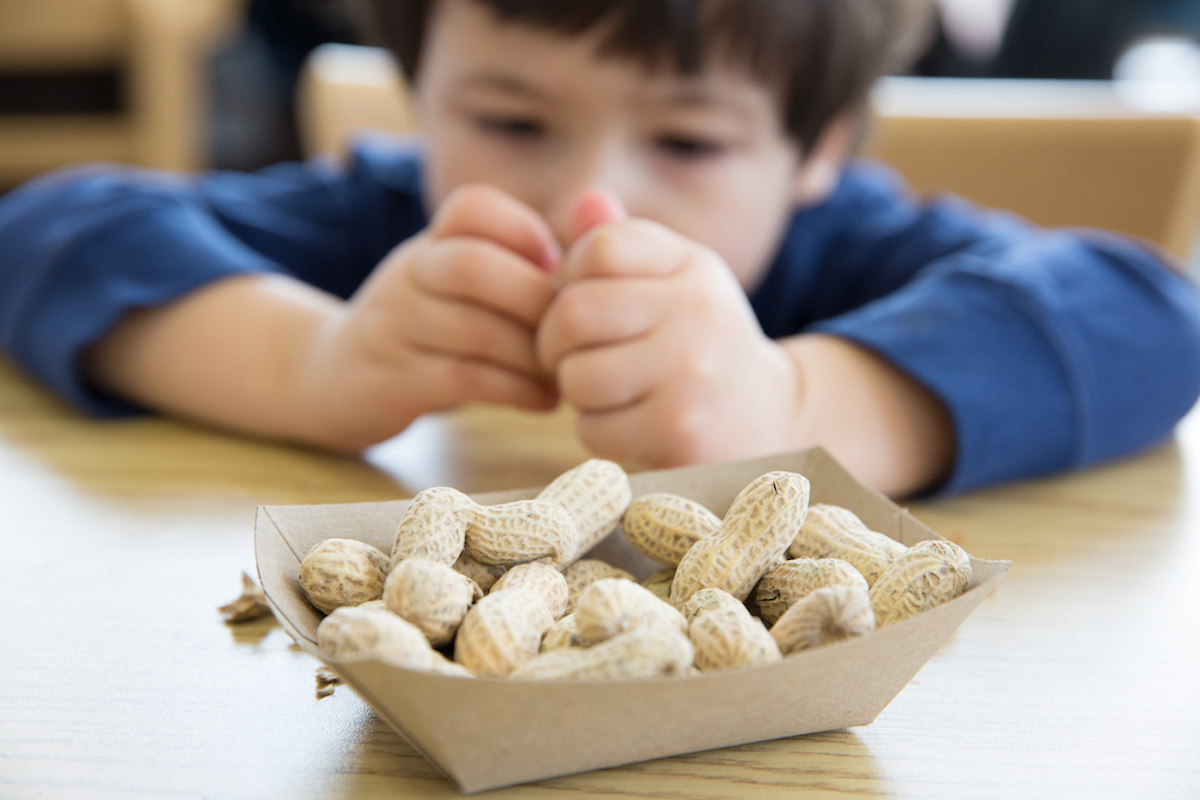For many new parents, just the idea of starting solids is stressful enough. Parents worry about choking or gagging on top of the logistical issues (when to start, whether you should eat with your child, and, of course, the debate over baby-led weaning versus puree).
Allergens add another layer to this stress. What if I give my child peanuts and they react badly? What would I do? It’s not surprising that some parents try peanuts or other allergens for the first time in a hospital parking lot.
Some children do have food allergies. And in earlier generations, the recommendation was to not introduce allergens until a year or even more — even in this one, for those of us with older kids, there was an abundance of caution around introducing allergens.
But all of that changed with some groundbreaking research in the early 2000s that suggested that not only was this hesitation about introducing allergens not necessary, it was actually making these allergies more prevalent.
The results from that study have led to one of the best evidence-based practices in early parenting.
Differences in peanut allergy rates in the U.K. and Israel
Dr. Gideon Lack, a researcher at King’s College London, studies allergies in kids, especially allergies to peanuts. At some point, perhaps through discussions with colleagues in Israel, Dr. Lack got the impression that peanut allergies were much less common among children in Israel than in the U.K. So in 2008 he published a paper testing this theory. Using a questionnaire covering about 5,000 children in each location and focusing on Jewish children in both Israel and the U.K., he found that school-age children in the U.K. were about 10 times as likely to be allergic to peanuts as children in Israel.

In the paper reporting these findings, Dr. Lack and his colleagues went beyond just showing the prevalence differences. They actually speculated as to why the differences existed: specifically, early peanut exposure. Children in Israel are more commonly exposed to peanuts early in life — there is a popular peanut-based childhood snack called Bamba — and the researchers argued that this exposure might be the cause of the lower incidence of peanut allergies in Israeli children.
Making this kind of claim based on these data is, to put it mildly, a bit of a stretch. A huge number of things differ between Israel and the U.K.! An obvious difference is diagnosis rate — what if even mild peanut allergies are diagnosed in the U.K. and only severe ones in Israel?
And if the data had stopped there, we’d be left with a vaguely interesting fact and some unsatisfying speculation about why. What is great about this example is that the Lack team followed up with the gold standard: a randomized controlled trial.
What did the early allergen introduction study find?
In the years following their initial findings, Lack and his colleagues recruited a cohort of about 700 babies between 4 and 11 months old and randomized them into a peanut exposure group and a non-exposure group. Parents of children in the exposure group were told to expose their kids to a dose of peanuts — about six grams a week — in the form of either Bamba or peanut butter. Parents of children in the other group were told to avoid peanuts.
The researchers selected a group of children who were more likely to have peanut allergies than the general population — this was important, to make sure they could draw strong conclusions even with a relatively small sample size. The kids were, of course, closely monitored for any adverse reactions.
The researchers finally published their findings in 2015 in the New England Journal of Medicine. I’ve graphed them below; they are striking.
Children who were exposed to peanuts early on were far less likely to be allergic to them at the age of 5 than children who were not. In the group that didn’t get peanuts, 17% of children were allergic to peanuts at age 5. (Remember, this figure is higher than it would be in the general population because of the way the researchers selected their sample.) Only 3% of the children who were given peanuts were allergic.
Since the study was randomized, there was no reason other than the peanut exposure that allergy rates would be different. The study also differentiated between kids with higher and lower allergy risk (based on their baseline reaction to peanuts), and the differences show up in both groups.
This finding suggests that exposing children to peanuts early helps them avoid peanut allergies — and that these effects are big. In the wake of these findings, the recommendations about peanut exposure have changed completely. Early exposure to peanuts is now the normal recommendation, especially for children at risk for an allergy.
Although the data is not complete, it increasingly seems like this evidence extends to other common allergens too. The vast majority of allergies result from eight food types: milk, peanuts, eggs, soy, wheat, tree nuts, fish, and shellfish. Even among these, the biggest culprits are milk, eggs, and peanuts. Other research suggests that milk and eggs work similarly to peanuts.
All this points to the possible importance of introducing all these allergens early — as early as four months, or whenever you start solids. (Milk can be introduced in the form of yogurt or cheese.)
Importantly, although the language here is about “introduction,” these studies include regular exposure as well. It is not enough to have your kid try peanut butter or eggs. You need to actually keep giving it to them regularly.
How can you start early allergen introduction?
This is a setting in which going slowly is a good idea. Try a little bit at first — only one allergenic food in a given day — and see how they react. If there’s no adverse reaction, give them a little bit more. And so on until you get up to a typical serving (say, a tablespoon of peanut butter or a full egg). You should be aware that some children show signs of allergies only after several exposures, which is why it is recommended that you continue trying out the allergenic food if they don’t have a reaction.
This is a lot, especially since most babies don’t really eat much food anyway. To consistently expose them to peanuts and yogurt and eggs on top of everything else (what about the peas?) requires some logistical work. If you are daunted, and especially if you’re very concerned about these issues, there are some products that contain powdered forms of these foods and are meant to be mixed with breast milk or formula.
It is important to say: even if you do introduce allergens early, your child may still develop an allergy. If this occurs, there are new treatment options (called oral immunotherapy) that may be available, especially if the allergy is very serious.
The bottom line
- Researchers in 2008 discovered that young children in the U.K. were much more likely to have peanut allergies than children in Israel, leading to the theory that early peanut exposure in Israel may reduce the likelihood of allergies.
- A randomized controlled trial confirmed this theory: children who were exposed to peanuts were far less likely to be allergic to them at the age of 5 than children who were not.
- Early exposure to allergenic foods (milk, peanuts, eggs, soy, wheat, tree nuts, fish, and shellfish) is now the normal recommendation, especially for children at risk for an allergy.
- When introducing allergens, start slow — only one allergenic food in a given day — and see how your baby reacts. Keep in mind that even if you do introduce allergens early, your child may still develop an allergy.

















Log in
I think the biggest worry for parents is that introducing an allergen can be fatal (hence the hospital parking lot snacks). What are the chances of that?
Can you share the links to the published data about Egg and Milk allergies also being sensitive to early exposure? I am a pediatrician and a parent – when my 5 year old was about 4 months old, I reviewed current literature and found that the evidence for egg was inconclusive and there was no published evidence to support systemic introduction of treenut, shellfish, cows milk protein, or soy. I imagine the data has evolved, and would love to see your citations. Also, I might suggest you revise your post to state that for children with a strong personal or family history of certain allergies, it may be indicated to do a blood test before testing foods at home – some kids and families should have a chat with their primary care provider or allergist before starting in on nuts/eggs.